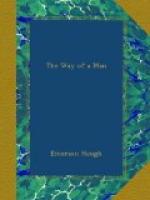CHAPTER XIV
AU LARGE
At our little village on the following morning, Auberry and I learned that the River Bell would lie up indefinitely for repairs, and that at least one, perhaps several days would elapse before she resumed her journey up stream. This suited neither of us, so we sent a negro down with a skiff, and had him bring up our rifles, Auberry’s bedding, my portmanteaus, etc., it being our intention to take the stage up to Leavenworth. By noon our plans were changed again, for a young Army officer came down from that Post with the information that Colonel Meriwether was not there. He had been ordered out to the Posts up the Platte River, had been gone for three weeks; and no one could tell what time he would return. The Indians were reported very bad along the Platte. Possibly Colonel Meriwether might be back at Leavenworth within the week, possibly not for a month or more!
This was desperate news for me, for I knew that I ought to be starting home at that very time. Still, since I had come hither as a last resort, it would do no good for me to go back unsuccessful. Should I wait here, or at Leavenworth; or should I go on still farther west? Auberry decided that for me.
“I tell you what we can do,” he said. “We can outfit here, and take the Cut-off trail to the Platte, across the Kaw and the Big and Little Blue—that’ll bring us in far enough east to catch the Colonel if he’s comin’ down the valley. You’d just as well be travelin’ as loafin’, and that’s like enough the quickest way to find him.”
The counsel seemed good. I sat down and wrote two more letters home, once more stating that I was not starting east, but going still farther west. This done, I tried to persuade myself to feel no further uneasiness, and to content my mind with the sense of duty done.
Auberry, as it chanced, fell in with a party bound for Denver, five men who had two wagons, a heavy Conestoga freight wagon, or prairie schooner, and a lighter vehicle without a cover. We arranged with these men, and their cook as to our share in the mess box, and so threw in our dunnage with theirs, Auberry and I purchasing us a good horse apiece. By noon of the next day we were on our way westward, Auberry himself now much content.
“The settlements for them that likes ’em,” said he. “For me, there’s nothing like the time when I start west, with a horse under me, and run au large, as the French traders say. You’ll get a chance now to see the Plains, my son.”
At first we saw rather the prairies than the Plains proper. We were following a plainly marked trail, which wound in and out among low rolling hills; and for two days we remained in touch with the scattered huts of the squalid, half-civilized Indians and squaw men who still hung around the upper reservations. Bleached bones of the buffalo we saw here and there, but there was no game. The buffalo had long years since been driven far to the westward. We took some fine fish in the clear waters of the forks of the Blue, which with some difficulty we were able to ford. Gradually shaking down into better organization, we fared on and on day after day, until the grass grew shorter and the hills flatter. At last we approached the valley of the Platte.




